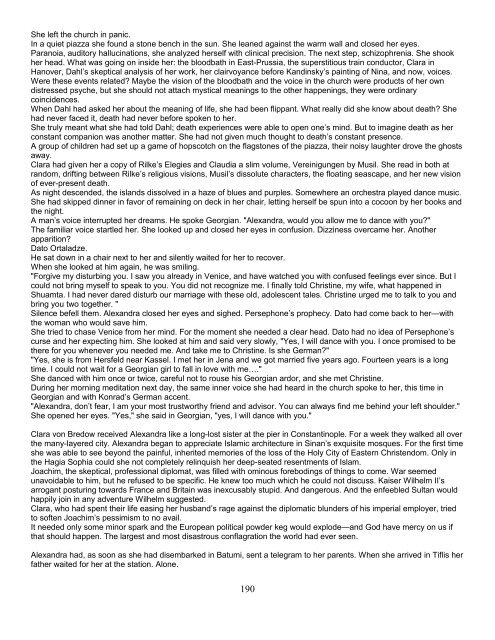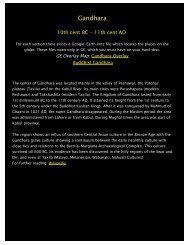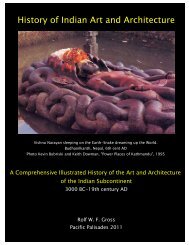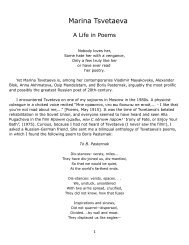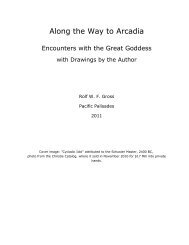She left the church in panic.In a quiet piazza she found a stone bench in the sun. She leaned against the warm wall <strong>and</strong> closed her eyes.Paranoia, auditory hallucinations, she analyzed herself with clinical precision. The next step, schizophrenia. She shookher head. What was going on inside her: the bloodbath in East-Prussia, the superstitious train conductor, Clara inHanover, Dahl’s skeptical analysis of her work, her clairvoyance before K<strong>and</strong>insky’s painting of Nina, <strong>and</strong> now, voices.Were these events related? Maybe the vision of the bloodbath <strong>and</strong> the voice in the church were products of her owndistressed psyche, but she should not attach mystical meanings to the other happenings, they were ordinarycoincidences.When Dahl had asked her about the meaning of life, she had been flippant. What really did she know about death? Shehad never faced it, death had never before spoken to her.She truly meant what she had told Dahl; death experiences were able to open one’s mind. But to imagine death as herconstant companion was another matter. She had not given much thought to death’s constant presence.A group of children had set up a game of hopscotch on the flagstones of the piazza, their noisy laughter drove the ghostsaway.Clara had given her a copy of Rilke’s Elegies <strong>and</strong> Claudia a slim volume, Vereinigungen by Musil. She read in both atr<strong>and</strong>om, drifting between Rilke’s religious visions, Musil’s dissolute characters, the floating seascape, <strong>and</strong> her new visionof ever-present death.As night descended, the isl<strong>and</strong>s dissolved in a haze of blues <strong>and</strong> purples. Somewhere an orchestra played dance music.She had skipped dinner in favor of remaining on deck in her chair, letting herself be spun into a cocoon by her books <strong>and</strong>the night.A man’s voice interrupted her dreams. He spoke Georgian. "Alex<strong>and</strong>ra, would you allow me to dance with you?"The familiar voice startled her. She looked up <strong>and</strong> closed her eyes in confusion. Dizziness overcame her. Anotherapparition?Dato Ortaladze.He sat down in a chair next to her <strong>and</strong> silently waited for her to recover.When she looked at him again, he was smiling."Forgive my disturbing you. I saw you already in Venice, <strong>and</strong> have watched you with confused feelings ever since. But Icould not bring myself to speak to you. You did not recognize me. I finally told Christine, my wife, what happened inShuamta. I had never dared disturb our marriage with these old, adolescent tales. Christine urged me to talk to you <strong>and</strong>bring you two together. "Silence befell them. Alex<strong>and</strong>ra closed her eyes <strong>and</strong> sighed. Persephone’s prophecy. Dato had come back to her—withthe woman who would save him.She tried to chase Venice from her mind. For the moment she needed a clear head. Dato had no idea of Persephone’scurse <strong>and</strong> her expecting him. She looked at him <strong>and</strong> said very slowly, "Yes, I will dance with you. I once promised to bethere for you whenever you needed me. And take me to Christine. Is she German?""Yes, she is from Hersfeld near Kassel. I met her in Jena <strong>and</strong> we got married five years ago. Fourteen years is a longtime. I could not wait for a Georgian girl to fall in love with me…."She danced with him once or twice, careful not to rouse his Georgian ardor, <strong>and</strong> she met Christine.During her morning meditation next day, the same inner voice she had heard in the church spoke to her, this time inGeorgian <strong>and</strong> with <strong>Konrad</strong>’s German accent."Alex<strong>and</strong>ra, don’t fear, I am your most trustworthy friend <strong>and</strong> advisor. You can always find me behind your left shoulder."She opened her eyes. "Yes," she said in Georgian, "yes, I will dance with you."Clara von Bredow received Alex<strong>and</strong>ra like a long-lost sister at the pier in Constantinople. For a week they walked all overthe many-layered city. Alex<strong>and</strong>ra began to appreciate Islamic architecture in Sinan’s exquisite mosques. For the first timeshe was able to see beyond the painful, inherited memories of the loss of the Holy City of Eastern Christendom. Only inthe Hagia Sophia could she not completely relinquish her deep-seated resentments of Islam.Joachim, the skeptical, professional diplomat, was filled with ominous forebodings of things to come. War seemedunavoidable to him, but he refused to be specific. He knew too much which he could not discuss. Kaiser Wilhelm II’sarrogant posturing towards France <strong>and</strong> Britain was inexcusably stupid. And dangerous. And the enfeebled Sultan wouldhappily join in any adventure Wilhelm suggested.Clara, who had spent their life easing her husb<strong>and</strong>’s rage against the diplomatic blunders of his imperial employer, triedto soften Joachim’s pessimism to no avail.It needed only some minor spark <strong>and</strong> the European political powder keg would explode—<strong>and</strong> God have mercy on us ifthat should happen. The largest <strong>and</strong> most disastrous conflagration the world had ever seen.Alex<strong>and</strong>ra had, as soon as she had disembarked in Batumi, sent a telegram to her parents. When she arrived in Tiflis herfather waited for her at the station. Alone.190
His hair had turned completely white, <strong>and</strong> he stooped more than she remembered. An old man. She embraced him. Butwhere were <strong>Konrad</strong> <strong>and</strong> Otto, were they all right? "They are fine, they are in St. Petersburg. Everything has changed,there will be no wedding."Irakli h<strong>and</strong>ed Alex<strong>and</strong>ra’s luggage to the houseboy <strong>and</strong> suggested they walk home. "I have to talk to you. Let’s go to theGerman café at the bridge."She linked her arm under her father’s to support him. He let it happen. They slowly walked through the streets on thedismal left bank. The old, white-haired gentleman was led by his young, tall daughter.At the café Irakli ordered coffee for them, <strong>and</strong> Alex<strong>and</strong>ra selected two pieces of torte.He spoke with a tired voice. "The wedding had to be called off. Tamara left with Vladimir in a dramatic show of rage. Itried my very best to patch the rift between her <strong>and</strong> David, but both were equally intransigent."He glanced helplessly at his daughter."David came down to stay with us after Tamara <strong>and</strong> Vladimir had arrived. Tamara <strong>and</strong> he had a terrible argument in myhouse. If David had not been such an old friend of mine, I would have thrown them both out. It was most embarrassingfor all of us—<strong>and</strong> yet I do sympathize with David."Alex<strong>and</strong>ra gave her father an affectionate kiss. A little embarrassed, he looked around, but then smiled gratefully at hisbeloved daughter."Chemo mama,”she said, “it took me many years to underst<strong>and</strong> your unusual relationship with me. I know of no otherGeorgian woman who has such an underst<strong>and</strong>ing father. I will love you forever for what you did for me <strong>and</strong> <strong>Konrad</strong> <strong>and</strong>look, it has worked so well."Irakli took her h<strong>and</strong>, raised it to his lips, <strong>and</strong> kissed her ring finger. "When you wanted to marry <strong>Konrad</strong>, I was not alone.Your mother, remembering her wild days before her marriage, helped me to let go of you. But <strong>Konrad</strong> is an unusual man.I don’t think Tamara <strong>and</strong> Vladimir will ever be happy together. But it is not for me to say so."He let go of her h<strong>and</strong> <strong>and</strong> gave her a bewildered glance. "Tamara wanted it her way, no church wedding, no ‘oldfashioned’rituals. Getting married was a concession to the child she carries, not to her parents. That broke David’s pride,he had barely swallowed the idea that she was pregnant. And you can imagine, neither of them wanted to give in."He raised his h<strong>and</strong>s in despair. "At the height of their argument David slapped her, <strong>and</strong> Tamara stormed screaming outof the room where they had been shouting at each other. She collected her belongings <strong>and</strong> the sheepish-lookingVladimir, <strong>and</strong> took the next train back to St. Petersburg. They will have a simple, expedient wedding there. Mostembarrassing was that David had to write letters to all the people he had invited. He left for Svaneti a broken man."Irakli touched her arm. "Are you going to stay with us for a few days? I can underst<strong>and</strong> that you would like to be with<strong>Konrad</strong> <strong>and</strong> your children, but please give us a few days to reassure us."She gently pulled him out of his chair. "Come, let’s go home, Deda will be waiting anxiously. I will stay with you for aweek."On the way home, while Alex<strong>and</strong>ra answered her father’s questions about Niko <strong>and</strong> Claudia <strong>and</strong> the Dahls, the eventsthat had led to this Georgian family disaster went through her mind. Had she overestimated her powers? She had beenthe one who had made it possible for Tamara to come to St. Petersburg. She had acted from the confidence of herexperiences, built on the unusual trust the old man on her arm had given her. Her dejected mood suddenly turned into awave of loving affection for her father, <strong>and</strong> in the middle of the street she embraced him spontaneously <strong>and</strong> kissed him."Thank you, mama, for your faith <strong>and</strong> your enduring love.""Ah, child, how often have I asked God's forgiveness that I loved you too much? May He hold His h<strong>and</strong> over you, <strong>Konrad</strong>,<strong>and</strong> your children."60.St. Petersburg Winter 1913 - 1914On his China trip <strong>Konrad</strong> had let his beard grow, not the wild, untamed one he had previously had, but a well-trimmed,civilized beard. It had turned out white. With his copious brown hair turning gray at the temples he looked dashinglyelegant. Helena, who had long had a crush on <strong>Konrad</strong>, "fell in love" with him, as she said.Alex<strong>and</strong>ra, feeling that she had ab<strong>and</strong>oned <strong>Konrad</strong> in too brusque a manner, asked Helena to occasionally visit <strong>Konrad</strong>while she was away. Thus <strong>Konrad</strong> found himself in the company of an adoring, striking woman.He invited Helena to dinner with Vitali Alekseev <strong>and</strong> El-Zafaran, to whom he owed a report on his searches for the Sufi<strong>and</strong> Ch'an. <strong>Konrad</strong> introduced El-Zafaran with a taunting smile, not as a Sufi sheikh, but as a Doctor of ComparativeLanguages, which quickly dispelled the initial formality. El-Zafaran laughed, he shouldn't have sent <strong>Konrad</strong> to Ramitani191
- Page 3 and 4:
Table of Contents1. My Grandfather'
- Page 5 and 6:
1.My Grandfather's Watch among the
- Page 7 and 8:
ditch beside the road.Mother was tr
- Page 9 and 10:
Deep snow still covered Djvari Pass
- Page 11 and 12:
"But you know nothing about how to
- Page 13 and 14:
newborn baby! You won’t need a ba
- Page 15 and 16:
Dadiani bent over the table, reache
- Page 17 and 18:
Autumn had come to Georgia, and it
- Page 19 and 20:
"Gespenstisch!" whispered Mouravi t
- Page 21 and 22:
Finally, depressed by his inability
- Page 23 and 24:
They slowly rode up the hill north
- Page 25 and 26:
On their way back to the Lavra Alex
- Page 27 and 28:
Blushing like a young girl, she gav
- Page 29 and 30:
Alexandra bowed deeply to a middle-
- Page 31 and 32:
All applauded and Ilia made a small
- Page 33 and 34:
She had done her hair up in a new w
- Page 35 and 36:
ape her. But then he must die, and
- Page 37 and 38:
a rear door when she entered.If Per
- Page 39 and 40:
Alexandra went purple with embarras
- Page 41 and 42:
The smell of roasting lamb wafted t
- Page 43 and 44:
Konrad quietly sat back. To his gre
- Page 45 and 46:
The tall, dark-haired woman began w
- Page 47 and 48:
She kissed him."Maybe you dream of
- Page 49 and 50:
14.Tuscany - the Wolfsons' House in
- Page 51 and 52:
ut are, unjustly, much more famous.
- Page 53 and 54:
Alexandra had fallen into melanchol
- Page 55 and 56:
She kissed him tenderly. "Niko, I a
- Page 57 and 58:
obligations, and she, ever since th
- Page 59 and 60:
months, was flooded with the diffus
- Page 61 and 62:
could they be aroused into communal
- Page 63 and 64:
19.An unexpected encounter with Vla
- Page 65 and 66:
chauffeur drop me at the station ju
- Page 67 and 68:
She described her sensation of flyi
- Page 69 and 70:
sky a thin, transparent blue. Imbed
- Page 71 and 72:
interest in Theosophy."Marti shrugg
- Page 73 and 74:
to?Mother had never mentioned any d
- Page 75 and 76:
"Ah, of course, of course, ‘Eine
- Page 77 and 78:
Konrad agreed that this sounded mor
- Page 79 and 80:
patriarchal oak and smiled, a littl
- Page 81 and 82:
have a similar situation in our vil
- Page 83 and 84:
Alexandra disagreed. "Most abortive
- Page 85 and 86:
a limited edition, hand-screened ma
- Page 87 and 88:
Alexandra touched her necklace and
- Page 89 and 90:
close!"She had hugged him, tears ru
- Page 91 and 92:
The others came lumbering up the st
- Page 93 and 94:
urden the heart with this task, whi
- Page 95 and 96:
the colors mixed and changed depend
- Page 97 and 98:
28.Kandinsky's suprising confession
- Page 99 and 100:
With kisses Alexandra removed the v
- Page 101 and 102:
He knelt, removed her knee and leg
- Page 103 and 104:
Joachim viewed Konrad with sympathe
- Page 105 and 106:
The rumbling continued at regular i
- Page 107 and 108:
Russia."She picked up a piece of br
- Page 109 and 110:
conservative pessimism, demanded th
- Page 111 and 112:
preventative method and taking it e
- Page 113 and 114:
new provocation in modern music and
- Page 115 and 116:
exhausted the Renaissance idea of b
- Page 117 and 118:
creative clairvoyance, and her shar
- Page 119 and 120:
Left to herself, Alexandra, awed, w
- Page 121 and 122:
public. She fended off the fuzzy wo
- Page 123 and 124:
ailways on strike. The strike had t
- Page 125 and 126:
Grandfather was very sad when he fo
- Page 127 and 128:
and put on his coat and shoes, he r
- Page 129 and 130:
Alexandra not in the mood to give V
- Page 131 and 132:
crowd of the fashionable and the ma
- Page 133 and 134:
established tradition with some mil
- Page 135 and 136:
42.Uncle Muravi's Benz, Tiflis1907"
- Page 137 and 138:
equisitioned a locomotive to take t
- Page 139 and 140: meaningless rituals. That may be on
- Page 141 and 142: lacking. I like this man, and at th
- Page 143 and 144: are suitably ambiguous."45.The Dadi
- Page 145 and 146: think of Munich or something else p
- Page 147 and 148: He showed them the room where they
- Page 149 and 150: death."Alexandra was more intereste
- Page 151 and 152: they fought over the offering. The
- Page 153 and 154: flew off cawing.Claudia grabbed Ale
- Page 155 and 156: Together they were hedging out a pl
- Page 157 and 158: the right of women to own their bod
- Page 159 and 160: The Chinese wife of a sinologist at
- Page 161 and 162: these texts."However, Ch'an is the
- Page 163 and 164: times, but moved back together agai
- Page 165 and 166: survived the Bolsheviks, the Fascis
- Page 167 and 168: physically overwhelm her. Despite h
- Page 169 and 170: Konrad picked up Alexandra at the t
- Page 171 and 172: Abruptly her vision had narrowed, a
- Page 173 and 174: the Kwadjagani, the Masters of Wisd
- Page 175 and 176: somewhat, his back was still bent,
- Page 177 and 178: century. The characteristic Chinese
- Page 179 and 180: Alexandra was relieved and happy, a
- Page 181 and 182: subconscious past her observant min
- Page 183 and 184: Dahl leaned back in surprise. "This
- Page 185 and 186: visions reappear. Entire armies mar
- Page 187 and 188: "This method is not easy, I have ne
- Page 189: He had started with representationa
- Page 193 and 194: Overnight the mood in St. Petersbur
- Page 195 and 196: daughter. His wife had left him no
- Page 197 and 198: which was presented to him—with a
- Page 199 and 200: "From the soldiers whom I took care
- Page 201 and 202: He watched Alexandra’s doubting m
- Page 203 and 204: lond, bony girl whose gray eyes loo
- Page 205 and 206: call it intellectual humanism. It d
- Page 207 and 208: time I asked this question I had me
- Page 209 and 210: "I spent most of the winter of 1918
- Page 211 and 212: We buried him in the cemetery at G
- Page 213 and 214: ways. Corruption became the way of
- Page 215 and 216: 68.A Concert in Kreuth - Eliso1989I
- Page 217 and 218: Eliso listened with increasing fasc


